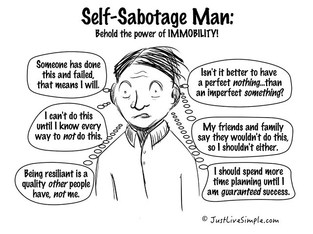|
Sabotaging is to deliberately destroy, damage, or obstruct something. Now, imagine doing this yourself that to your self, diligently, day in and day out year after year. That's some serious self-sabotaging. It is not that we are consciously choosing to sabotage ourselves. It happens as if it is an automatic program, a program that got embedded in childhood, a non-stop tape inside our heads that constantly speaks to us in a voice that tells us what's 'wrong' with us, why we cannot succeed despite working hard and how things will never be any different. It is a program that tells us we are not OK, and it keeps getting reinforced till it becomes so scary for us to come close to actually tasting real success, or find our true potential, that we scuttle our chances, we sabotage ourselves so that the 'I knew I couldn't get it' program can win, yet again  What constitutes self-sabotaging behaviour ? The self-sabotaging stems from a firm belief that we are undeserving of love, unworthy of victory, incapable of achieving goals and with every successive 'I told you so' the belief hardens and this in turn reduces our ability to achieve what we want. With every failed attempt, we are proving ourselves that we are incapable of being good at anything. Seeking success of any kind makes our this program kick in, and we start anticipating failure, pain and emotional hurt. To try and protect ourselves from this anticipated pain, we do something or get into behaviours that make it impossible to even attempt and certainly difficult to succeed. That's self-sabotaging behaviour. Self-sabotaging in that sense comes from a need of self-preservation. We create something that can take the blame for the failure. We now have a reason for why something didn’t work out. Our failures therefore are not a result of incompetence but an outcome of choosing some other thing, or an act of nature or just plain bad luck. Sometimes, self-sabotaging behaviour comes across as simple forgetfulness ('Oh, dang! I forgot my cell phone. Now, I just cannot call her to ask for a date.') or procrastination. At other times, it can even seem altruistic and magnanimous - like giving to a competitor your key insights and work products. It can get really dangerous as well - like the dancer who literally breaks a leg for fear of getting on that stage, or the lover who deliberately cheats because this relationship is getting serious. Over the long term, such instances of self-sabotage can become patterns of really harmful behaviour: self-medicating, substance abuse and other ways of self-harm, and that can really be a challenge  Have you noticed how, sometimes we change when dealing with an outsider, especially non-Indians? It happens to so many of us. We become more self-conscious, and even if we are well-qualified and experienced, transform from being confident professionals into nervous novices, quite unconsciously. What causes this? Thinking that ‘they’ know better? Or that it is ‘their’ process? Or cultural stereotypes? We could speculate about it, but cannot know for sure. Fact is quite often, relocating to a new environment, or working with a colleague from a different culture, especially a foreigner, makes us behave differently even if it is on phone. We under-sell ourselves and it is not great for our self-image, and given that collaboration is key, not good for the work product as well. The good news is: If we become aware of it, and get back in touch with our inherent strengths, we can certainly make it a really useful work environment. Here are some tips that might help you deal more confidently with these situations: Believe in your core strengths What makes you unique? Why did your company hire and retain you? Is it your technical ability, knowledge, managerial skill, multitasking ability, or anything else? Think about why you were hired for your job and continue to do it to the best of your ability. Your role is not to have excellent English skills or great social skills - it is to do the job you were hired to do. Remember that. Prepare for your visitors or your visit Whether you are hosting a visitor or you are travelling, it helps to be prepared. Read up on the local culture including small things from greetings like ‘How are you today?’ to handshakes or physical contact, to etiquette on splitting the bill. Remember the objective of the visit: the work, and at the same time, see if there are some things similar - perhaps cricket, or music, Game of Thrones. There is usually something. Start with similarities, and any established work process or protocol. Connect at the similarities and you will be two people working together, no matter what each of your roots. If nervous, reach out to more experienced colleagues. Be proactive – ask questions when you need to and seek the help you need. Be Yourself Understanding them doesn’t need to mean acting like them – continue to be yourself, and be ready to talk about your own needs and choices (like food preferences, for example). Communicating your needs and requesting for help clearly makes things much easier for everyone involved. Don’t try and second guess your colleagues or expect them to guess your discomfort and help you. Do remember – nobody is ‘better’ than anybody else. We are as good as our work. Be proud of your own culture, and at the same time, be open to other cultures and people. Bottom-line: Learn to appreciate the differences, while also starting from the similarities. by Krithika Akkaraju
|
InnerSight BloggersAjanta, Mahesh and other InnerSight counsellors and guest contributors are happy to share their thoughts here. Categories
All
Archives
September 2020
|

 RSS Feed
RSS Feed